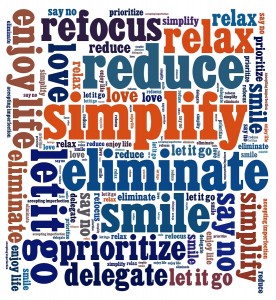Tulips, lawnmowers, graduations, home sales… these are all signs that spring is here and, with it, new beginnings.
Here in our NAPO-Greater Philadelphia Chapter, we are also looking at new beginnings. May is the month that NAPO starts its new board term. Volunteers who have served the chapter over the past year have either chosen to remain in their positions, continuing to pursue their goals and enhance their knowledge of and through this incredible organization, or to move on to other equally challenging and rewarding positions.
You see, NAPO-GPC is a professional organization comprised of solo entrepreneurs who come together to serve in volunteer positions and create something akin to a very highly efficient corporation. We serve on boards and organize recycling events, we post weekly blogs and maintain a group website, we host quality educational programs and mentor new organizers, we provide speakers for area home shows and volunteers for local charities. We create annual strategic plans and work all year to actually achieve them – and we do! And we do this all for free.
Crazy right? We can’t really have sustainable businesses and still do all of this – can we? Yes, we can. And we do.
Don’t get me wrong; we’re not a bunch of martyrs. There is a method to our madness! “Volunteering” is another way of getting what we want. And, as business-owners, what do we want? – We want to learn new skills specific to our profession. We want to find out about business development techniques & technologies that can help us grow our businesses. We want the time to volunteer in our communities and make a difference. We want networking opportunities that will benefit our careers.
In our businesses, the approximate 80 professional organizers and corporate associate members that make up NAPO-GPC are out there every day in the communities of Greater Philadelphia organizing offices and homes, helping hoarders and families and business men and women to create greater order, peace and prosperity in their lives.
I am very fortunate to be a part of all of this and, as NAPO-GPC President starting my second term, I would like to thank all of the volunteers that make this organization the shining success that it is (from the blog editor who is posting this letter for me to all the members who choose to serve on the Membership, Technology, Marketing or Professional Development teams). Specifically I thank the outgoing board members who have done so much to serve this chapter: Ellen Tozzi, Jackie Mangasarian, Dan Loya, Barbara Siegel and Carla Shipman.
Next, I would like to acknowledge the new Board of Directors that will serve with me and who are already up and running: Vice President, Debbie Lillard; Past-President, Kathy Luskus; Secretary, Naomi Cook; Treasurer, Emily Anderson; Communications & Technology Director, Gabrielle Watters-Smith; Marketing Director, Darla Pompilio; Membership Director, Annie Amoon Richard; and Professional Development Director, Rachel Gambone.
Finally, I am going to take a brazen and shameless moment to claim bragging rights as one of our NAPO-GPC members becomes President-Elect of the National Association of Professional Organizers. Congratulations to our very own Ellen Faye!
I look forward to another year of education, community, achievement and fun with this amazing group of professionals!
 The weather is finally starting to cooperate, and I am in my ‘container garden’ mode- of- thinking. This is the perfect time to talk about outdoor organizing, as I am in the process of gathering all of my gardening essentials (potting soil, pots, gardening gloves, watering can, etc) to plant my flowers.
The weather is finally starting to cooperate, and I am in my ‘container garden’ mode- of- thinking. This is the perfect time to talk about outdoor organizing, as I am in the process of gathering all of my gardening essentials (potting soil, pots, gardening gloves, watering can, etc) to plant my flowers.
Whether you live in an apartment, condo, or single family home, you should organize your outdoor items such as your gardening tools, lawn equipment, and/or outside furniture. Sorting like items together allows you to know what you have, which in turn will help you to know what you may need to purchase, as well as to help you find things more easily.
Below are my three Outdoor Organizing Tips:
Take advantage of this glorious weather to plant. Then, all you’ll need to do is to sit back, relax, and enjoy the longer days of summer. Some of the best parts are being able to barbecue and to watch your flowers and plants grow.
Are you one of the (scientifically identified) 6 million people who avoids shredding your sensitive documents because of your home shredder. 5.9 million of that number have actually burned up at least one home shredder at some point. 5.8 million have burned up more than one. (I might have made those numbers up.) It might be twice that high. Most families should own a cross-cut personal shredder. They are actually very easy to keep in good shape.
Here’s help on how to use your home paper shredder.
If you follow these guidelines, your home shredder should do the job for many years. However, if you regularly have more than 2 shopping bags full of material to shred, you can search for free or low-cost community shredding events in your area. Just Google “shred events” and your city, zip code, or region. You can find a current list of shredding events in the greater Philadelphia region
Here is a list of breitling replica shredding events in the Delaware Valley. If you are planning to attend an event, it’s wise to check the website or to call or e-mail to make sure the event isn’t canceled due to weather or other circumstances.
If you can’t wait for an event, try drop-off shredding services from Staples, Office Depot, Wiggins, or Mail Source (Springfield) for about $1 per pound.
Happy shredding!
Saturday, May 31 10 am – 12 pm Philadelphia
Passyunk Square Civic Association (PSCA)
1400 East Passyunk Avenue & Reed Philadelphia, PA 19147
Friday, June 6 3 pm – 5:30 pm West Chester
West Chester Wiggins Auto Tags
1301 West Chester Pike West Chester, PA 19380
2 paper grocery bags are $10.00
http://www.wigginsshredding.com/residential/tear-fests.php
Saturday, June 21 9 am – 12 pm Glenside Residents Only
Copper Beach Elementary School
825 North Easton Road Glenside, PA 19038
http://www.montcopa.org/DocumentCenter/View/6715
http://www.shredone.com/community-shredding-events
Saturday, June 21 10 am – 12 pm West Chester
West Chester Wiggins Auto Tags
1301 West Chester Pike West Chester, PA 19380
2 paper grocery bags are $10.00
http://www.wigginsshredding.com/residential/tear-fests.php
Saturday, June 28 9 am – 12 pm Doylestown
Doylestown EAC Central Park
Wells Road Doylestown, PA 18901
http://www.titanshredding.com/Community-Shredding-Services.aspx#calendar
Saturday, July 12 9 am – 12 pm Abington Residents only
Abington Township Public Works
2201 Florey Lane Abington, PA 19001
http://www.shredone.com/community-shredding-events
 Typically in our society, we acquire items, things, and stuff. We use our valuable time to acquire these so called treasures. It may have felt good to collect and accumulate. Yet, when it’s out of control it appears as clutter and usually those feelings change. Overwhelm shows up. That’s the signal, the “red flag”, that it is time to take some action. One action could be evaluating and accessing the reasons you have what you have. We are not talking about items that serve a purpose, are useful, and make your life better.
Typically in our society, we acquire items, things, and stuff. We use our valuable time to acquire these so called treasures. It may have felt good to collect and accumulate. Yet, when it’s out of control it appears as clutter and usually those feelings change. Overwhelm shows up. That’s the signal, the “red flag”, that it is time to take some action. One action could be evaluating and accessing the reasons you have what you have. We are not talking about items that serve a purpose, are useful, and make your life better.
Are you holding on dearly to the “stuff” that:
1. Represents “Who” I am, or “Who” I was, or “Who” I want to become
Do you like any of these “Who’s”? Sometimes they don’t align with who you are presently, or they are reminders of the past, or even reminders of in-completions. If you don’t feel energized or happy with them, then why keep them around?
2. I may need this someday
Future thinking that could keep you up to your eyeballs in excess stuff. It could be said this indicates a lack of trust in the future. Our thoughts can create our reality. If unconsciously your thoughts are coming from a place of lack, you will create that. What do I mean? If you trust that you will have all you need , you will have it!
3. I got this as a gift
Just because your favorite person bought this doesn’t justify saving space for it if you don’t need, want, or like it. Re-gifting or donating gives it a new life from gathering dust or buried in a pile. Using places for unwanted items takes away your precious space.
4. Family relics that have been passed on to me
So maybe you have inherited these things that have no meaning or sentimental value to you. If you feel you want to memorialize the people, choose a few items and get creative. Make a shadow box or a special area to display them. If you will have joy and feel happy seeing these items in your home, then that’s what counts!
5. I feel secure having this/ Can’t have empty space
No matter how many possessions you acquire the need for more will occur. Remember to keep what makes you happy, and give away what you don’t like. If you don’t like empty space, look at why. Also keep in mind that no matter how much you have, keep these areas safe and accessible. This is your home and a place to retreat to from the outside world.
6. It cost so much/got it for free
It’s all relative to how you look at value. Whether you spent more on an item or got it for free it comes down to how you view this. When looking at an item in this category to purge or keep, check out if your beliefs or values around the money are holding you back from making the decision. This awareness may open you up to making a decision based on what you like regardless of the cost.
Looking at these categories and evaluating brings self awareness and conscious choices. This awareness can lead you to taking another step; recognizing what’s behind your decision making. If you choose to recognize these things it might set you free. One being mental clarity and then giving yourself the freedom to make a choice. The choice of physically letting items go that you don’t really want, or keeping what you truly treasure!
 If you are reading this, chances are that you will need an executor and/or will be an executor at some point in your life. An executor is the person named in a will to administrate the estate of the person who died leaving that will. The job of the executor is to make sure that the deceased person’s wishes, as described in the will, are carried out.
If you are reading this, chances are that you will need an executor and/or will be an executor at some point in your life. An executor is the person named in a will to administrate the estate of the person who died leaving that will. The job of the executor is to make sure that the deceased person’s wishes, as described in the will, are carried out.
Here are some of the tasks executors perform:
These tasks can be complex, full of “red tape” and frustrating, so it is important to choose the right person for the job.
A good executor is:
Too often, people making a will choose their executor based on family dynamics or out of a wish to bestow an ‘honor’ on a special person in their life. They give little consideration to the personal traits and skills needed by the executor, with disastrous results. As a professional organizer specializing in finances and paperwork, I have witnessed these horror stories when the wrong person was chosen for the job of executor:
The key take-away from this post is to choose your executor carefully, based on the skills needed to do the job. But perhaps, you have already chosen an executor who lacks some of these skills, and you don’t want to make waves by changing. Or maybe, you have been named as someone’s executor and feel unqualified for the job. In either case, don’t despair, because help is available. Professional organizers can help inventory the deceased person’s possessions, and can help sell and/or donate possessions not inherited by a specific individual. Some organizers specialize in the organizing of finances, paperwork and information, and can help with these aspects of the executor’s job. A good place to find an organizer to help with the administration of an estate is the ‘Find an Organizer’ link at www.napo-gpc.org.